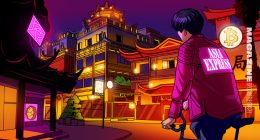[This story contains major spoilers from the second season of Netflix’s Russian Doll.]
The first season of Russian Doll set viewers on a high-concept time loop with its starring characters, Nadia and Alan. The pair kept dying and coming back to life to re-live the same night. On its surface, the sci-fi story was a wild ride filled with twists and turns, a memorable bathroom door and Harry Nilsson’s tune Gotta Get Up — and it delivered a truly satisfying ending.
Bubbling underneath, co-creator Natasha Lyonne explains, the first season was tackling the very tangible problem of being self-destructive: Nadia and Alan can’t stop dying until they find a connection.
And now that they have found each other, enter season two.
“OK, now that I’ve stopped dying, what does it mean to be alive? How do I start living?” Lyonne tells The Hollywood Reporter of her looming question this time around. And, as viewers who have finished all seven episodes will come to know, that philosophical theme comes with a twist: “If season one was Groundhog Day, well, fuck it, season two is going to be Quantum Leap.”
The second season, which released on Netflix on April 20, catches up with Lyonne’s Nadia and Charlie Barnett’s Alan four years after the events of season one when, just as their lives seem to be settling, Nadia stumbles upon a time portal — via the New York City subway — and steps off of her 6 train and onto a platform in 1982. The twists start to unfurl from there as viewers, along with Nadia, realize that not only has she time-traveled, but she’s also swapped bodies with her mother, Lenora (played by returning star Chloë Sevigny).
An opportunity then presents itself: Can she fix the generational trauma in her past in order to prevent some of the hardships she experienced in her life? As her journey continues, she time travels even further back to body-swap with her grandmother, and Alan hops on his own train for a parallel family journey. Ultimately, when sitting on the subway and faced with the women in her family — and after attempting to kidnap herself, as a baby, and bring her to the present — Nadia realizes that her efforts have been spent in the wrong timeline.
“The deeper layer of this kind of Russian Doll metaphor is that there is no shortcut around the mountain,” she says. “You must go through the mountain; you must climb up and back down the other side.”
Below, in a chat with THR, the writer, director and showrunner unpacks that takeaway and the man-in-the-mirror final scene, separates the self-referential from the sci-fi, and looks ahead to what a third season might tackle.
Initially, you said you weren’t sure how big of a role Nadia might play in a second season. Were you keeping that close to the vest at the time, or did you ever consider telling this as an anthology without you starring in it as Nadia?
I think it was close to the vest, only because the show wasn’t quite yet fully realized. The original pitch that we did back in the day was when we hadn’t even been in the writers room yet. Many of those things did not even come to pass, and things evolve as they become real. As a major example, Alan did not exist in our initial pitch. There were so many other examples, but the Alan that you see in the show only came to life midway through the writers room on season one.
The seed of that Nadia idea was that she wouldn’t be the same Nadia as you knew in season one. The idea was that, potentially, I would play different characters. At the time, we had a sense of more of an anthological potential for a flashback where I would be playing my mother. But it was more like my mom in ‘80s New York, Tompkins [Square], gentrification of the neighborhood. I don’t think we had a fully formed idea beyond an ongoing sense of hauntings and that the show would always have an element of a haunting to it.
Then in the hiatus before we started the room [for season two] was really when I started to think about this Quantum Leap game, and the idea of body-swapping. That version of the idea of me playing [my mother] Lenora had been gently touched on. But once I got into the room in season two, we completely committed to this body-swapping Quantum Leap season — if season one was Groundhog Day, well, fuck it — season two is going to be Quantum Leap. That idea oddly has a lot in common with what my sense of what a season three might be, but it still has trans-mutated over time as the series itself has evolved and changed.
At the time of our pitch, we essentially had a pilot pitch fully realized and a sense of an arc and a sense of three seasons. Now that things have evolved, I can see where there’s still a germ of that. But of course, you have to knock out all the walls and build story out around it — it’s not three lines in a pitch document. What’s on my mind in this moment is that Russian Doll is essentially a series about some sort of answers, about opening up philosophical and metaphysical questions and answering some of those questions. There are so many tentacles and iterations of what that could end up looking like once you’re actually trying to build real narrative around it — and story and conflict over the course of four hours.
It’s interesting — and kind of meta to the concept of the show — to hear about that journey of making Russian Doll.
Yeah, the evolution. You have to see it on its feet. For example, you hear about this all the time with series — which is what makes them so different than movies — you don’t know what’s really going to connect with this idea of a sequel. But there was something so moving about seeing Chloë in that role [of my mother], and there was something so moving about seeing young Nadia that, had they not been as impactful, had that not been played by Chloë, maybe the original idea would have made more sense.
Had there never been an Alan storyline in season one, maybe season two would have gone in a totally different direction. So it’s all sort of contingent on what ends up actually on the page and being filmed and how it’s realized and what connects and what you feel like you want to dig in on more and what feels like the open questions. I have a lot of questions now about these characters that are more over-arching, now that we know them so intimately.

This season feels personal in a different way, compared to the first (which was also personal for you). What made you want to go down this particular rabbit hole of Nadia trading bodies with her mother?
You are right to say, theoretically, that this ride that we have been through together, just in making things that we’re sharing with each other, is also a personal evolution. I can’t speak to where I’m not at. At the time, what was most pressing was this idea of self-destruction. And, how on earth did that even happen? [In making season one], I felt just far enough away from it that it felt like I was safe enough removed to fictionalize.
I am always so struck by the absurdity of people saying that this is straight memoir or something — as if I’m a time-traveling person who is birthing children on the MTA platform [like in the season two finale]. It’s pretty odd! (Laughs.) But I know people need context to make things make sense. But, believe me when I tell you, that I’m working just as hard as the next guy to create fiction. It’s certainly helpful that I’ve had a breath of life experience, but it’s not like I’m trace-papering onto the page.
It’s a bit of a double-edged sword. It doesn’t completely address the work on its own — on its face — to say that it’s strictly personal. Which is a long way of saying that I appreciate you saying that, and it’s certainly helpful to have been through certain experiences to be able to say, “OK, now I’m far enough removed from this experience of essentially becoming an adult that I feel like I can create narrative science fiction around that experience of adulting. And being a high-functioning, participating member of society who still feels, in some ways, unresolved.” I think that was really the itch that I wanted to scratch.
Can you elaborate on that itch?
With Nadia and Alan, a lot of it — based on my travels dealing with people who have turned their lives around — is that [making peace with these lingering questions] is not uncommon. It’s tangible. Of course, the B-side of it is: Now that you are a functioning person in society, you almost have to go a level deeper, spiritually, to understand the ramifications of being in the world of the living.
And there’s so much material out there in the realm of self-help that I think the troublemaker in me laughs at the idea of literally kidnapping your inner child. Is that a shortcut or a workaround for doing that kind of work that you guys are always talking about? There was a spirit of a prankster in there. But, it is a similar journey in seasons one and two; season two is just a deeper layer of this kind of Russian Doll metaphor, which is that there is no shortcut around the mountain. You must go through the mountain; you must climb up and back down the other side.
The show will always be a measure of a hero’s journey, matrilineal resolution by virtue of its largest pieces. That’s inherently what it is architected to question — the show is just hopefully doing it in a pretty out-there way. And I guess, in many ways, it is my curious response to the ongoing suggestions of society about how to “fix it.” That’s personally what makes me laugh.
The biggest thing that I’m drawing on is not the personal life of my mother. Those are just specifics to color things in with to make things come alive. My real mother and Chloë couldn’t be more different. There’s no coincidence that I’m choosing the coolest girl in the world to play somebody who makes me feel pretty uncomfortable. It’s sort of a way to handle that discomfort. I’m choosing the safest person I can find in my life, so it doesn’t get too intense for me. So it’s not an actual portrait in that sense. And my grandmother, too. I love my grandmother. She wore Pucci dresses and she was like the one presentable figure in my family. I’m definitely drawing on specifics where I can to realize things.

It seems like that Russian Doll metaphor hits Nadia in the finale scene on the subway. She decides to give up her quest to change the past and focus on the present, so she doesn’t miss Ruthie’s (Elizabeth Ashley) wake. Then, she’s back in Maxine’s (Greta Lee) familiar bathroom and once again looking in the mirror, and there’s a range of emotions across her face in that last scene: regret, acceptance — and something else. What is she thinking and what wisdom will she take with her on her next journey for a season three; if season one is dying and coming back to life and season two is about what to do with your time living, what is she looking for next?
David Lynch would say, let the work speak for itself. But I guess I haven’t earned that right yet.
You’ve earned it. But if you will unpack it, I’ll hear it!
The other major storyline that is happening this season is Nadia’s inability to show up. In adulthood, we become the caretaker of the parent. If the entire show is about mortality and a mediation on the nature of our limited time here and in the realm of those questions, it is just a simple fact of growing up that a time comes when we’re expected to be the caretaker of the parent. It’s much easier to be the rebel. In Nadia’s case, it’s almost like she has to resolve the business of her birth mother in order to be able to show up for this reality of her adoptive mother [Ruth], for a lack of a better term. And I think it’s about: when we are spending so much time in the past, we are losing our time here in the present.
And questioning the reasons she cannot show up and look at that reality of real mortality. Sure, she comes by it honestly. She survived all these death loops; she had trouble with her mommy. But, ultimately, that’s exactly what’s robbing her of this very real and present responsibility to show up for Ruth in the way that Ruth has shown up for her. That’s at the heart of this midlife crisis — which is typically male — that we’re seeing with Nadia where, instead, she’s finding this loophole and this way out. It’s her mind tricking her to saying, “There’s a workaround here.” But, of course she’s going to be faced with those same things.
Part of it is accepting this. She’s at Ruth’s wake. It’s a dense moment where all of those things are happening at the same time. She has Alan back, but she also has the reality of this chosen family and she also has this lingering question of: Man in the mirror, can you face him now? And with the sort of gaming mindset that she has a piecing together of time to ask: where did those weeks go, and what does that mean to find herself back in this moment?
And with Alan, this is Ruth’s wake and probably not the time to get into it, but, they’re owed a major conversation about what the fuck just happened. He is going through a very similar game of needing a piece of information and needing to make peace with a vision of idealist self in order to make sense of his real life in the here and now. I just love the unconditional way that they show up for each other. As these characters get deeper, I’m personally very moved by them as just a true example of nonjudgmental and unconditional love for each other.
The question, the itch I’m trying to scratch and what I’m bringing into the room is almost three years after I’ve sort of topically investigated it for a deeper dive, and when it feels safe for fictionalizing in a group. But, those are the philosophical questions on my mind: What does it mean to stop dying? What does it mean to start living? And the good and bad news, for me and for the show, is that I don’t feel like I ever have a shortage of questions. There are plenty of questions that remain unanswered in this game that we are all in together.

In the specificity of your storytelling, season two becomes this universal ride. So I’m glad to hear that you have more questions and story to tell.
I really appreciate that. I hope people like me and like the work; I’m not above that meaning a lot to me. Where the life experience part comes in is that I’ve been around enough to see that a lot of these things that I’m discussing are actually not as hyper-specific as people make them seem; a lot of people have family members or friends or they themselves are in similar questions and cycles. I think it means something — it means something to me — to feel like it’s a place to talk about that stuff a little bit more freely and with a little bit less shame.
Maybe it frees up some of the embarrassing parts about talking about that kind of stuff because it feels like there’s cool music playing. That’s why I’m always putting those songs in — so that it doesn’t feel so weird to feel your feelings. We’ve all felt this. Even some of the hits have felt this, right? This is normal. We’re in this thing together. That’s why this season I wanted music that was a little more universal, so it felt like we’re all in this thing and it’s OK to talk about this stuff. We don’t have to call it names. This is not messy business. It’s just the real business of being alive, whether we like it or not. I think it’s good to just make it a little but more mundane, a little more workaday. I don’t know that the show has that aesthetic! But, that is the hope. I remember Leslye [Headland, co-creator] and I editing season one and hearing about Anthony Bourdain[‘s death] and it was just like, “Jesus, this stuff is happening all the time around us.” If you’re going to make something, you may as well make it, that’s all.
This interview has been edited for length and clarity.
The second season of Russian Doll is now streaming on Netflix. Read THR‘s profile on Lyonne here and listen to her chat on the TV’s Top 5 podcast here.
Source: Hollywood









